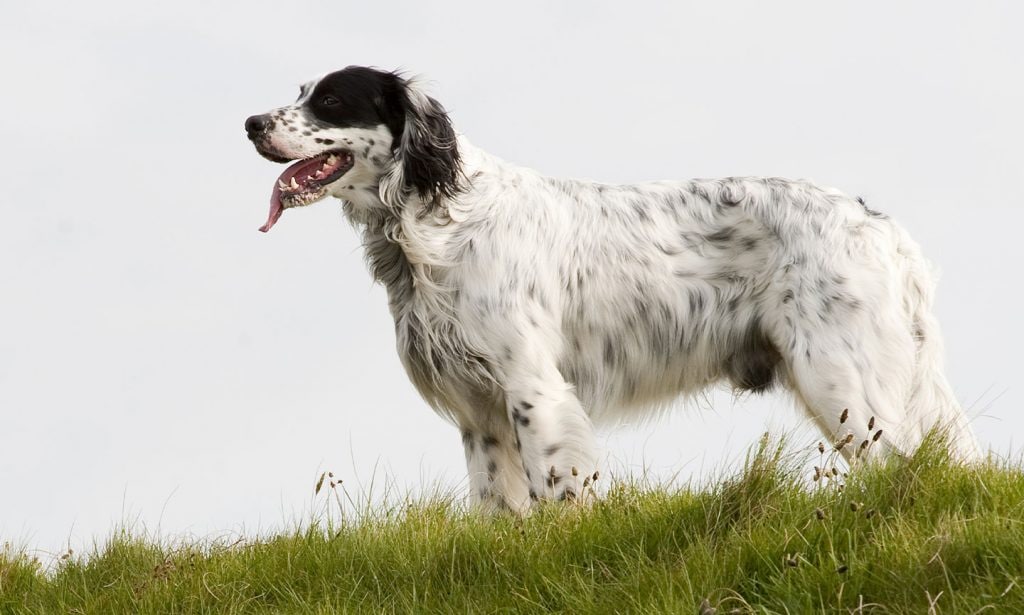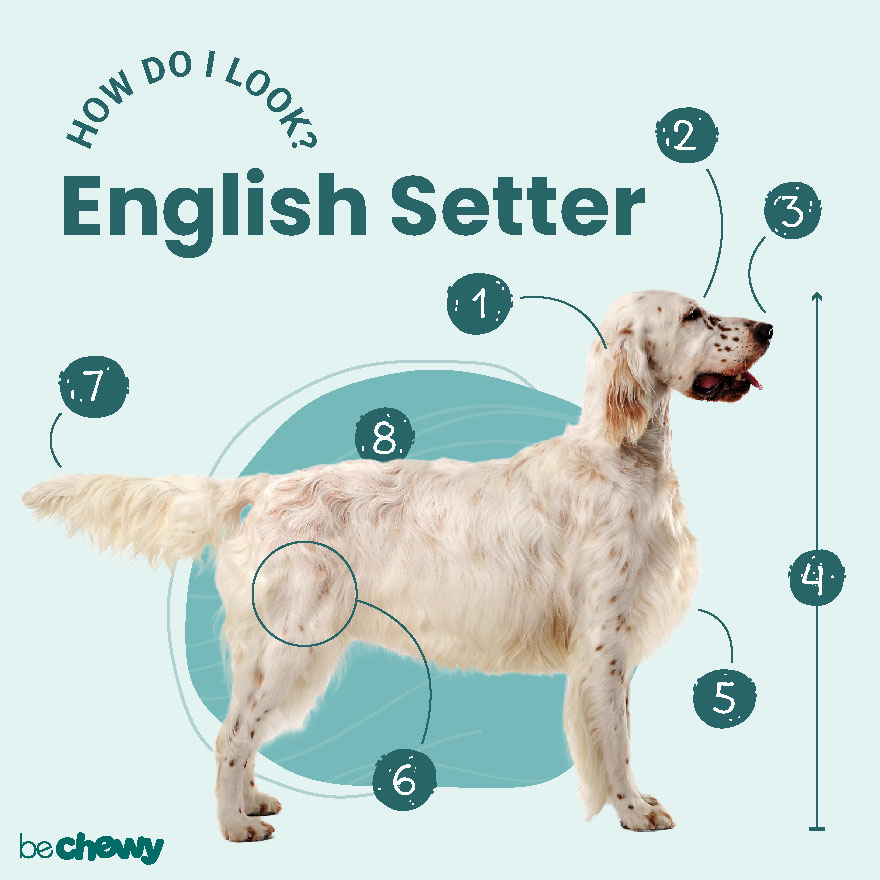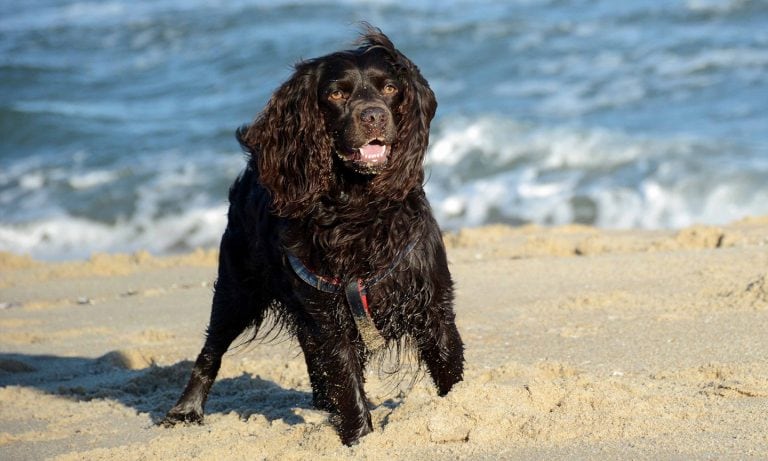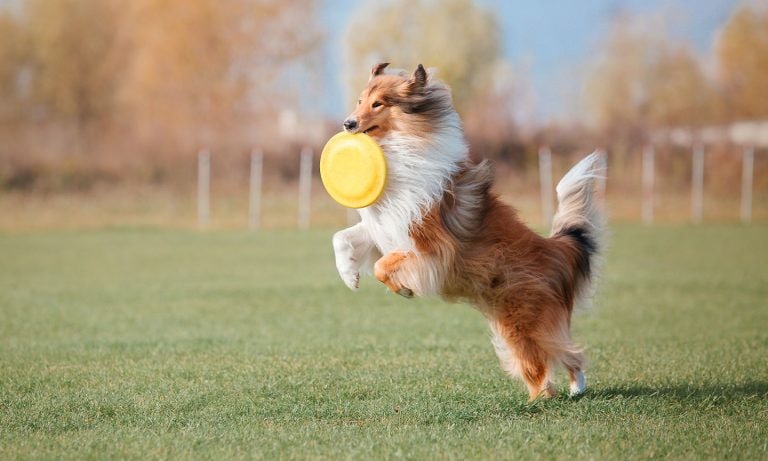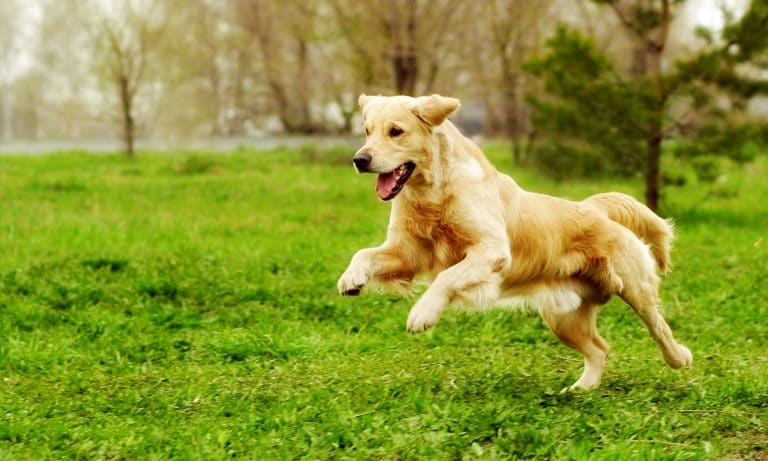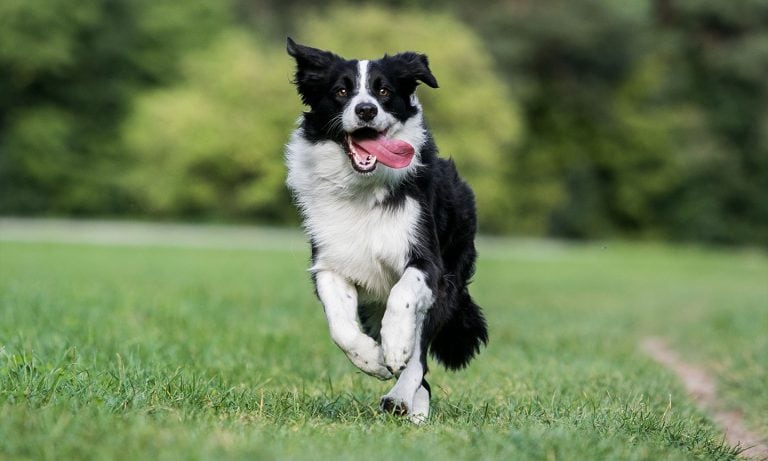English Setters never seem to take a bad photo—just look at that coat! But these dogs aren’t all glammy and Instagrammy; they enjoy a bit of rough-and-tumble play as well. And while they do love a grand outdoor adventure, they’re perfectly happy with a long walk and games of fetch with you where they can get their wiggles out. And really, having their BFF (that’s you!) with them is really the deciding factor—if you’re going, they’re going. And if you’re staying in, they will, too. They’re just delighted to be your sweet sidekick.
Breed Snapshot
Temperament:
Social ButterflyAffectionateHigh-EnergyCoat Color:
Blue BeltonBlue Belton And Tan (Tri-Color)Lemon BeltonLiver BeltonOrange BeltonWhite
Best For
English Setter dogs are social and high-energy pups who require lots of exercise and grooming. They thrive with active pet parents and families with kids, and can be a great choice for first-time pup parents.
English Setter Temperament
English Setters are happy-go-lucky pups who are gentle and affectionate and great with kids; they think everyone they meet is their best friend. These guys will be your biggest fan, so make sure to invest in a comfy dog bed and put it in the center of the action as they’re happiest when surrounded by the love and laughter of their people, both day and night.
These pups are great playmates for kids, and they’re more than happy to join other dogs in the home. While they’re born hunters, they can get along with cats as long as they’re raised with them from puppyhood. But expect these dogs to chase smaller pets, like rabbits and hamsters; they may be a challenging addition if you keep critters at home.
English Setters are alert and protective and make great watchdogs. They won’t hesitate to sound the alarm when someone unfamiliar approaches, but once settled, they’re just fine—they tend to return to a state of calm pretty quickly too.
How to Care for a English Setter
It’s just a fact that a dog with such a gorgeous and luxurious coat is going to be high maintenance, and the English Setter is true-to-form. While they shed a moderate amount, their coat care, training and exercise needs will require a lot of your attention. But hey—it gives you more time to love on your pup.
English Setter Health
Bred as sporting dogs, English Setters are quite hardy. While they have a life expectancy of 12 years, there are a few health issues and problems that potential English Setter pet parents should be aware of.
- Hip and Elbow Dysplasia: With hip and elbow dysplasia, the bones that make up the joints in those areas don’t form correctly, causing pain for your pup. Common symptoms of hip and elbow dysplasia include limping and an unwillingness to play. Treatment includes medication, physical therapy and surgery in severe cases.
- Hypothyroidism: Dogs who suffer from hypothyroidism have an underactive thyroid. This condition can lead to weight gain, lethargy, excessive shedding, hair loss and itching and redness of the skin. Hypothyroidism is typically diagnosed with a blood test and managed with daily medication.
- Deafness: Deafness is another health condition commonly seen with English Setters, especially if they are all white. It’s important to remember that dogs can live full and wonderful lives despite being deaf.
English Setter History
The origin of the English Setter goes back centuries where records indicate they were trained bird dogs in England. (The term “setter” refers to the seated or crouched position these dogs assume when they discover game; they lay down quietly or “set.”) However, the history of the modern English Setter begins in the 19th century where the breed was first developed by Englishman Edward Laverack and Welshman R.L. Purcell Llewellin.
At one point, English Setters were referred to as Laverack or Llewellin Setters, a name clearly reflecting their lineage. But eventually, the roads diverged for this breed. The Laverack line became known as the show-dog type, and the Llewellin line was prized for their field qualities.
English Setters were one of the first nine breeds ever registered in America and joined the American Kennel Club when it was founded in 1884. As part of the Sporting group (dogs who work with hunters), English Setters have retained their popularity since their introduction.
While Setters are sometimes mistakenly believed to be one breed that includes English, Irish, and Gordon Setters, these three types of dogs are, in fact, three separate breeds with different traits and characteristics. The English Setter, for example, is slightly smaller than Irish Setters or Gordon Setters, and they are known for being more gentle as well.
If the English Setter sounds like a match for you, you can find reputable breeders on AKC Marketplace. The average price for a puppy is around $700 but can go up depending on the pup’s lineage and pedigree. For that price, you’re likely getting a puppy who’s been screened for health and temperament issues and may come with pedigree papers. You can also reach out to English Setter rescue organizations, keep an eye out for the breed at your local animal shelter, or search Chewy’s database of adoptable dogs in your area.
FAQs
Do English Setters shed?
Yes, English Setters shed moderately, but you can manage their shedding hair with regular brushing and baths. (And keep the vacuum handy.)
When do English Setters get their spots?
Surprise! English Setters don’t get their spots at birth; they’re born solid white, like Dalmatians. Their spots start to appear within days after their birth. What begins as tiny pinpoints of color on their tummies and muzzles eventually turns into larger speckles, ticking or belton.
Are English Setters good family dogs?
Yes, English Setters are great family dogs, and they are never happier than when they’re a part of the hustle and bustle a family offers. These guys love their humans and by your side is where they prefer to be. This breed is good with kids, and with proper socialization and an introduction from an early age, they’re good with cats as well.
Are English Setters easy to train?
English Setters are smart as a whip, so they’re pretty easy to train. However, pet parents may want to keep in mind that while they are intelligent, they think they’re pretty smart, too, and you may find they’re a bit stubborn. But with patience and consistency, you can bring your puppy to your way of seeing things.
What are the most common English Setter mixes?
- English Setter-Poodle mix (English Doodle)
- English Setter-Labrador mix (English Setter Labrador)
- English Setter-Border Collie mix (English Borsetter Collie)
- English Setter-Golden Retriever mix (English Setter Golden Retriever)
- English Setter-Pointer mix (English Setter Pointer)

Top Takeaways
English Setters are sweet pups who make great companions, workout partners and family dogs. These guys are happiest when they’re with the people they love the most, and they’re pretty tolerant of strangers. A daily walk is often sufficient exercise for these pups, and a weekly brushing should do plenty to maintain their good looks.
Expert input provided by Jamie Freyer, DVM, and Jody Haas Wolfson, CPDT-KA, and owner of Root Dog Training.
Breed characteristic ratings provided by Dr. Sarah J. Wooten, DVM, CVJ, a veterinarian at Sheep Draw Veterinary Hospital in Greeley, Colorado; dog trainer and behavior consultant Irith Bloom, CPDT-KSA, CBCC-KA, CDBC, owner of The Sophisticated Dog, LLC, in Los Angeles; and certified animal behavior consultant Amy Shojai, CABC, in Sherman, Texas.
The health content was medically reviewed by Chewy vets.

Search for Adoptable English Setters Near You
Female Names
- Sadie
- Willow
- Luna
- Daisy
- Ellie
- Bella
- Millie
- Molly
- Dottie
- Pepper
Male Names
- Cooper
- Tucker
- Archie
- Finn
- Boone
- Arlo
- Gunner
- Winston
- Bandit
- Max
Share:
